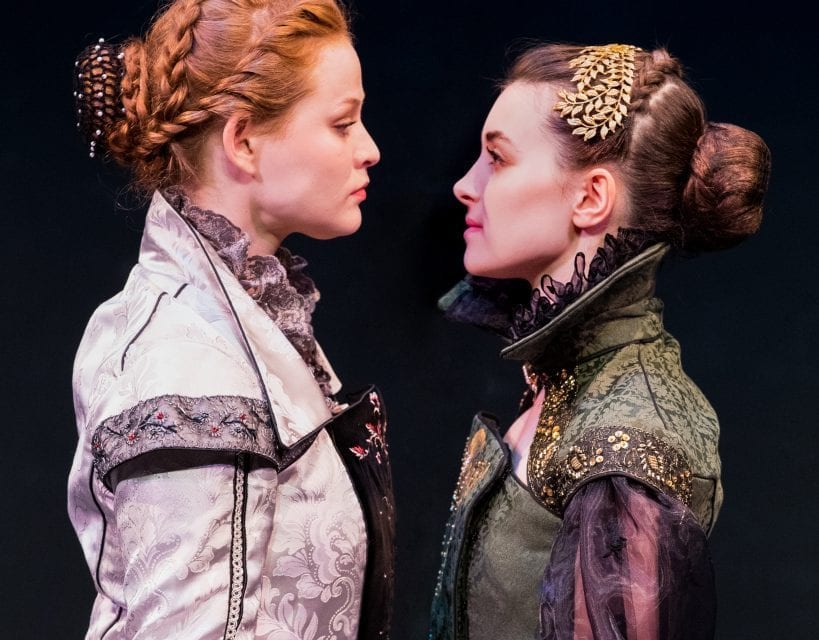PROVO — Elizabeth I was not always “Good Queen Bess,” certainly not to her cousin, Mary, Queen of Scots, whose claim to the throne of England was at least as strong as Elizabeth’s. As Friedrich Schiller has written the history in Mary Stuart, it continues to illuminate problems of government today, as the audience watches bureaucratic scrambling to avoid accountability.

Show closes March 24, 2018.
Even though this play is translated, its power puts it in the same class as Shakespeare. If it were performed as often as, say, Richard III, audiences would come to appreciate its strengths. Kudos to BYU for contributing to the process, with a very stylish, even sumptuous production. The historical problems of legitimacy, accountability, and popular sovereignty in the script are set forth clearly, with wit and insight. Can Elizabeth be secure on the throne while a younger, more personally attractive rival lives? Will the people continue to approve the death of Mary they seem to demand so loudly? When dealing with a capricious monarch, can a subordinate protect himself from changes of whim?
The mood is set by a plainchant introduction, intoned by monk-like figures, giving way to cello, violin, and guitar. These musical interludes recur, reminding the audience of when and where the play is set. BYU is fortunate to have a performer in the role of Leicester so skilled as a cellist (Solomon Reynolds, moonlighting from his duties as deejay for soon-to-be-no-more Classical 89.1 FM). However, the picture frames carried by the actors, and perhaps intended to remind us of the weight of ancestry in the scales of royal legitimacy, were less effective.

Left to right: Solomon Reynolds as Leicester, Madison Hall as Queen Elizabeth I, Dylan Wright as Mortimer, and Miriam Edwards as Mary Stuart. Photo by Savanna Richardson.
Schiller wrote his last plays, including this one, in a very Shakespearean blank verse. BYU used the new version from poet Peter Oswald, which is based on the earlier Hilary Collier Sy-Quia translation from the German. The result is a deeply impressive, sonorous language, perfectly reflecting the seriousness of the subject matter, yet retaining the fluidity and word-play of the original. The one jarring exception is Elizabeth’s demand that Davison (played by Clara Richardson) “Do your job.” The German, Amt connotes ministerial function, and the anachronistic job calls attention to itself. “Perform your ministerial function” might be excessive, but “Do your duty,” would not be.
Stephanie Breinholt‘s staging for the play is polar, with the audience on both sides of a long rectangle with Elizabeth (roughly) at one end and Mary (roughly) at the other. The fatal (and ahistorical) meeting between the two takes place centrally, in the garden at Fotheringhay Castle, where they circle each other like feral cats until Mary, provoked beyond endurance, calls her cousin a bastard.
While not strictly faithful to the time period, the costuming design by Rebekah Silver Jackson was consistent, vivid and rich, and evocative of the period. The complete hooding of minor characters providing only atmospheric functions occasionally distracted. Props (designer uncredited) were minimal, but were inventively used in the critical opening and closing scenes in Mary’s apartments in Fotheringhay. The focus of the play is the polarity of the two queens and the meeting between them. For all the reasons given in the text, this is a meeting that could not have taken place, but Schiller uses it to humanize his protagonists and to personalize their rivalry.
The two queens were played beautifully by Madison Hall (as Elizabeth I) and Miriam Edwards (as Mary). Schiller wrote the parts for characters significantly younger than history provides, and these two actresses beautifully carried out Schiller’s intent.

Miriam Edwards as Mary Stewart. Photo by Savanna Richardson.
Even though Mary’s fate is sealed, Elizabeth seeks to avoid the responsibility for Mary’s death. Having signed the death warrant, Elizabeth refuses to direct Davison to deliver it to Mary’s wardens. Davison pleads for explicit orders; Elizabeth refuses. When Burleigh (played by Erin Ellis) seizes the warrant and executes it, Elizabeth sends Davison to the block and banishes Burleigh for doing what she obviously wanted done. After all, she had suborned Mortimer (played by Dylan Wright) to murder Mary, yet another way to get her will without accepting responsibility. The play has no fewer than three echoes of Henry II’s reported plaint, “Will no one rid me of this turbulent priest”. At least Henry finally accepted responsibility (and did penance) for his outburst. Elizabeth never did.
The whole warrant scene played like an episode from the Trump White House, where no one can figure out who fired Rob Porter, or when, and whether the Great Firer wanted it done or didn’t. This question of where the buck stops is one of the timeless themes from Schiller’s play.
It was hard to tell if there was a real attempt at authenticity of dialect. Edwards seemed to have a trace of a French (in truth it was closer to Spanish) accent, appropriate, since French was her first language. The French and Spanish ambassadors also sported acceptable accents, but Hanna Kennedy’s (Jeanelle Long) was more problematic. I’m not wholly certain she was trying, and she needn’t have, since it’s unlikely that a Scot of 400 years ago would sound like Hamish Macbeth anyway.
The casting of women in men’s roles did not seem to have any direct purpose, so I assume the BYU needs more men in its casting pool. Frankly, while no harm is done with the character of Paulet (played by Madison Haws and the only wholly admirable character in the play), Burleigh, who was the power behind Elizabeth’s throne, would have profited by a man’s touch, as Talbot (played by Andrew Groome) certainly did. However, this cross-gender casting did perhaps make more telling Mary’s complaint that the lords of the Tudor court were “Rather like eunuchs in a sultan’s harem.” The German there has “slaves in a sultan’s harem,” but I suppose that practically it comes to the same thing.
In the last scene, Mary’s confession and absolution, carried out under special dispensation by Melvil (played by Kristian Huff), Schiller, though a Protestant himself, shows remarkable sympathy to Mary’s Catholic convictions. This might have been an implicit plea for tolerance between the English and Mary’s Continental manipulators. Regardless of the message that audience members take from it, Mary Stuart is an important and relevant play, and this cast gives it an impressive reading.
Donate to Utah Theatre Bloggers Association today and help support theatre criticism in Utah. Our staff work hard to be an independent voice in our arts community. Currently, our goal is to pay our reviewers and editors. UTBA is a non-profit organization, and your donation is fully tax deductible.





